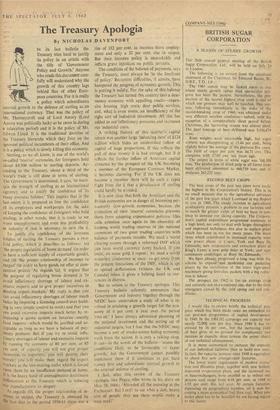COMPANY - MEETING
BRITISH SUGAR CORPORATION
A SEASON OF STEADY GROWTH
THE 26th annual general meeting of the British Sugar Corporation, Ltd., will be held on July 24 in London.
The following is an extract from the circulated statement of the Chairman, Sir Edmund Bacon, Bt.. 0.B.E., T.D.; J.P.: The 1961 season may be looked upon as one where steady growth rather than spectacular pro- gress has been the pattern. Nevertheless, the pro- duction of the second highest crop yield is one of - which our growers may well be satisfied. This suc- cess, following immediately in the wake of the record-breaking crop of 1960, was obtained under very different weather conditions—indeed, with the exception of a comparatiVely short period before Christmas, the harvesting season was almost ideal. The final tonnage of beet delivered was 5,936,479 tons. • Root weights were reasonably high, but sugar content was disappointing at 15.44 per cent., being slightly below the average of the previous five years. The yield of sugar per acre was 44.71 cwt. This compares with 37.05 cwt. ten years ago.
The output in terms of white sugar was 760,388 tons, The production of dried pulp in all forms from beets delivered amounted to 460,739 tons and of rnolassei 265,252 tons.
RECORD BEET CROPS
The bcc.t crops- of the past two years were easily the highest in the Corporation'S 'history. This is in no small measure 'due to the agricultural advances of the past few years which I, outlined in my Report to you in 1960.. The. steady increase in agricultural productivity presents a problem, to our factories and to match the greater yields of beet we have to con- tinue to increase our slicing capacity. The Corpora- tion's capital expenditure programme Continues at a high level, not only to deal with larger throughput and improved techniques but also to replace plant which has been in use for many years. The'main items which contributed to increased capacity were new power plants at Cupar, York and Bury St. Edmunds; new evaporators and extraction plant at King's Lynn; a new pulp drier at York; and new continuous centrifuges at Bury St: Edmunds.
We have already progressed a. long way. with the scheme to expand and modernise our packeting plants by the installation of the latest high-speed machinery giving first-class packets with a big reduc- tion in labour.
The prospect for 1962' is for. an average crop and certainly not-an exceptional one, due to the slow emergence caused by the cold spring and soil con- ditions.
TECHNICAL PROGRESS
I would like to review briefly the technical pro- gress which has been made since we embarked on our post-war programmes of capital development in 1949. In the 1961/62 campaign our capacity was nearly 52,000 tons per day. Since 1949 it has in- creased by 36 per cent., but the increasing yield of beet gives us no ground for complacency and increase in capacity must remain the prime object of our technical advancement.
It is more economical to increase the capacity of our individual factories than to build new ones. In fact, the capacity increase since 1948 is equivalent to about five new average-sized factories.
The lower water requirement of modern extrac- tion and filtration plant, together with new boilers, improved evaporation plant, and the increased use of heat-exchangers, have enabled us to reduce our process coal usage from 6A8 per cent. in 1948 to 4.95 per cent. this last year. At certain factories, depending on geographical location, oil is now be- coming a more economical fuel than coal. When new boiler plant has to be installed we are having regard to this factor.










































 Previous page
Previous page